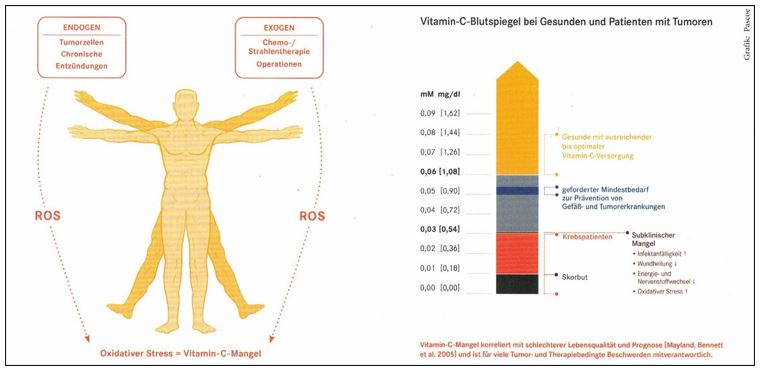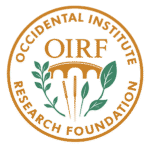A Cancer Therapy Special
Vitamin C in Complementary Oncology
The Supportive Effect of Ascorbic Acid
For those in a hurry
Surgery and subsequent treatment deprive cancer patients of Vitamin C. Balancing is important because ascorbic acid provides fundamental support for patients. It fights oxidative stress, strengthens the immune system and relieves tumor and therapy related pain.
Vitamin C can be found in high concentrations in many organs. In addition to the general positive properties, vitamin C helps in particular with cancer illnesses. It fights oxidative stress and supports tumor and therapy related pain. In addition, Vitamin C can improve the quality of life of the ill.
An integrative approach prevails more and more in the treatment of oncological diseases. This is a good development, because when it comes to cancer illnesses, there are still the anxious questions in the range of: “How can I get through what is coming to me now?”, “Do I have a chance of healing?”. This is a stressful situation for patients and practitioners.
In 2019, the renowned Fachzeitschrift Nature [Nature Journal] reported on the effects high-dose Vitamin C can show in oncology(2). Research and discoveries on the importance of Vitamin C in cancer illnesses have increased almost exponentially over the past decade.
In holistic cancer therapy, three effects of Vitamin C are in the foreground:
- Prevention of Vitamin C deficiencies that would otherwise promote tumor progression
- Multiple chemotherapeutic effects and improvement of epigenetic profile
- Improvement of quality of life – especially fatigue and pain
Important Vitamin
Vitamin C is involved in more than 150 metabolic functions in the body(3) and is found in high concentrations in many organs. In addition to the liver, eyes, bones, kidneys and blood vessels, Vitamin C is mainly found in the brain and cells of the immune system. People with acute infections may suffer from Vitamin C deficiency: the Vitamin C concentration in leukocytes can drop by 50% within a few hours during an acute infection(4). If the vitamin is not supplied again in sufficient quantities, this can severely limit the body’s defense system. Additionally, Vitamin C is essential for the activity of natural killer cells and increases the number of B- and T- lymphocytes, the central players of our immune system. Preclinical studies also show improved phagocytosis and chemotaxis with ascorbate(5).
Another mechanism by which Vitamin C strengthens the immune system is its involvement in the epithelial barrier function. If the collagen synthesis is reduced due to a deficient Vitamin C level, the tissue becomes more permeable to pathogens and thus more susceptible to infections(5, 6). An already known and well-researched mechanism exists between inflammation and oxidative stress. Reactive oxygen compounds are increasingly released by neutrophils and macrophages in the course of inflammatory reactions. Oxidative stress, on the other hand, causes Vitamin C deficiency and thus further weakens the immune system(5). This can result in a reduced immune system with increased susceptibility to infections. Due to its diverse mechanisms of action, logically in consequence a deficiency of this Vitamin can also have very versatile effects on the body.
Deficiencies
Only with difficulty many people open up to the fact that a Vitamin C deficiency can exist. After all, the shelves in the supermarket are abundantly filled with fruit and vegetables and for many a lack of Vitamin C and the disease scurvy belong with the seafaring past. Nevertheless, studies on the supply situation for cancer patients show that this group of patients very often suffers from Vitamin C deficiencies, sometimes even scurvy. The deficit is particularly severe in advanced tumors(7).
The causes of Vitamin C deficiency are not only to be found in a poor diet:
- Surgery leads to increased consumption, which is further intensified by subsequent radiation and/or chemotherapy. Many tumor and therapy related symptoms in cancer patients are contributed by oxidative stress (see also Figure 1). As the body’s most important antioxidant, Vitamin C fights increased oxidative stress.
If Vitamin C deficiency is compensated, the antioxidant effect of Vitamin C infusion therapy can help alleviate symptoms in cancer patients and significantly improve their quality of life(8,9). But Vitamin C is also important for reactions that prevent cancer cells from growing unhindered(10-12).
 Figure 1: Surgery, subsequent treatment, and
Figure 1: Surgery, subsequent treatment, and
oxidative stress can lead to Vitamin C deficiency.
Essential for Survival
A Vitamin C deficiency is connected with a poorer survival prognosis(13). The reason: Vitamin C is a co-factor of reactions that are of great importance for the inhibition of tumor growth. An example of this is hypoxia-induced factor (HIF), for which research the Nobel Prize in Medicine was awarded in 2019.
A look at history
Linus Carl Pauling received the Nobel Prize twice: in 1954 for chemistry and in 1962 for his commitment against the proliferation of nuclear weapons. For the medical world, perhaps his work on understanding the physiological and pharmacological role of Vitamin C has become the most essential. Pauling is often seen as the founder of orthomolecular medicine. Although it is known that a balanced diet that includes an adequate intake of Vitamin C has a positive influence on the immune system and reduces susceptibility to infections, the therapeutic value is still often underestimated. Pauling, who himself consumed up to 18 grams of Vitamin C daily, was decades ahead of his time in many respects.
HIF is a transcription factor, thus a kind of “on-switch” for the formation of numerous proteins, which are also of particular relevance in oncology. HIF plays a central role in the growth and metastasis of cancer cells by switching on genes for glycolysis and growth factors for angiogenesis. This is very relevant for tumor growth, because tumor cells have switched to anaerobic glycolysis and require the migration of new vessels to grow. That is why it is so important that HIF can be degraded and thus the formation of growth-relevant substances is switched off again. Oxygen and Vitamin C are needed for the breakdown of HIF. A Vitamin C deficiency can therefore have fatal consequences.
New studies of biopsies of breast cancer tissue show that increased HIF activity is associated with advanced stage, increased vascular invasion, and decreased survival. Higher concentrations of Vitamin C in tumor tissue, on the other hand, correlate with lower HIF activity and increased survival time(10).
Advantageous
Vitamin C has a differentiating effect and shows multi-targeting effects. You could also say: Vitamin C knows exactly what it’s doing – it protects healthy tissue, but is selectively toxic to tumor cells. At first glance, this is an apparent contradiction. But the effects can be explained pathophysiologically: In high doses, Vitamin C has a pro-oxidative effect on tumor cells and an antioxidant effect on healthy tissue(7).
Vitamin C has the potential to expand the therapeutic range of radio-, chemo-, immune and targeted therapies as well as their efficacy. It is becoming increasingly clear that people who have certain genetic mutations may particularly benefit from Vitamin C, such as KRAS, BRAF, TET2 and IDH-1 mutations(15).
The benefit of Vitamin C can be explained, among other things, by the treatment of Vitamin C deficiency, which is very common in cancer patients. In vitro, Vitamin C in millimolar concentrations (1-20 mM) shows tumor cytotoxic effects in a variety of tumor cells. In vivo studies observe inhibition of tumor growth and reduction of metastasis formation by administration of high parenteral doses of Vitamin C (1-4 g/kg body weight) in most cancers. So far It has been examined in combination with 59 cancer therapeutics (chemotherapy drugs, radiation, targeted and immunotherapies) and has shown an improvement in efficacy in the vast majority of studies(15). Vitamin C intervenes in many metabolic pathways and can thus reduce not only tumor proliferation, but also the risk of metastasis.
Vitamin C:
- has a selective pro-oxidative effect (H202) and thus cytotoxic effect on cancer cells
- performs important immunomodulatory functions
- has an epigenome-regulating effect (TET2 ⇑ HIF ⇓)
- reduces epithelial-mesenchymal transition
- improves collagen formation
- regulates kinase activity
Proteome, transcriptome and metabolome analyses also show important effects on glycolysis, iron metabolism, apoptosis and energy metabolism. All clinical studies to date show that even very high doses of intravenously administered Vitamin C (>75 g) show good overall tolerability.
People with impaired kidney function, kidney stones, iron storage disorders, or glucose-6-phosphate dehydrogenase deficiency should not receive high-dose Vitamin C infusions. Caution is demanded with individuals who require regular glucose monitoring, because intravenously administered Vitamin C may interfere with the evaluation of a rapid glucose test.
Case study
Brigitte G. was diagnosed in 2015 with right mammary carcinoma, HER2 positive, pT2 (22 mm) pN0 (0/1 sn-) G2 L0 V0 R0 M0. She was 51 years old and received Paclitaxel 12 times and then Tamoxifen. The patient tolerated the chemo very poorly. She was additionally supplemented with selenium supplements and infusions with Vitamin C, Pascorbin 7.5 g, which were administered with a time delay with chemotherapy. As a result, nausea, fatigue, loss of appetite and feelings of disgust for food were noticeably reduced for her and she was able to “finally go through the chemo”. She went into the woods for an hour a day and to the gym 2-3 times a week. Mrs. G. survived her illness and there were no polyneuropathic consequences. To this day, she is tumor-free, has dared to take another career step and continues to receive Vitamin C infusions if necessary.
Strengthened in Therapy
When fatigue gets out of hand, the quality of life dwindles. In this sense, tumor-related fatigue is often evaluated even more negatively than pain by those affected. The drift of exhaustion into chronic fatigue should be avoided as much as possible. However, fatigue cannot be captured with classic medication. Here, the strategy applies in lifestyle: encourage and support. Regular exercise, as good and as much as it is appropriate, protects against fatigue, but too much can also have the opposite effect.
The research group led by Anitra C. Carr at the Centre for Free Radical Research at the University of Otago in New Zealand sees great potential in high-dose Vitamin C infusions(8). This is plausible, because a Vitamin C deficiency can be largely responsible for many tumor and therapy related complaints. In their 2014 review, which examined five clinical trials and two case studies, well-validated questionnaires were used to identify symptom improvement in many areas.
For example, in the retrospective cohort study in breast cancer patients, the product Pascorbin 7.5 g, which is approved in Germany, was evaluated. The overall evaluation of all symptoms showed that complaints in the Vitamin C group were reduced by 37% during standard therapy and by 53% during aftercare compared to the control group. In particular, the symptoms of nausea, loss of appetite, exhaustion (fatigue), depression and sleep disorders occurred less frequently in patients with supportive Vitamin C infusions(1) (see also Figure 2).
 Figure 2: Infusions of Pascorbin reduced tumor and
Figure 2: Infusions of Pascorbin reduced tumor and
therapy related symptoms in breast cancer patients.
In the case study, the advantage of the infusions for the patient was more than noticeable. From a scientific point of view, the explanation for this can be seen on the one hand in the antioxidative and anti-inflammatory effect of the vitamin and on the other hand in its function as an enzymatic co-factor.
Overcoming Trauma
Anyone who receives a cancer diagnosis is initially in shock: “I went for a routine check-up and came out of the practice as a seriously ill person.” This shock needs to be processed, the diagnosis accepted and finally a powerful way through chemo, surgery, radiation has to be found. All of this is a highly emotional process, not only for those affected, but for the whole family and the [social] environment. It is a matter of finding a language and a way of dealing with existential issues. That’s a big challenge.
Support
Psycho-oncological care is very valuable for the whole family. Those who manage to gather a supportive team from different disciplines around them can spread the burden. Here, those who are spiritually anchored in a faith will be able to draw strength particularly well. Nature is a great healer for many of those affected. In the forest you can let go and “recharge your batteries”.
Fear of Side Effects
In particular, the side effects of chemotherapy and radiation frighten many people. In fact, these are usually to be expected, because in addition to the tumor cells, the healthy cells of the body also suffer. Symptoms such as nausea and vomiting, fatigue and increased susceptibility to infections are common. Because cytostatics are usually oriented to attack the rapidly dividing tumor cells, those healthy cells that divide rapidly in the body are also particularly affected. This affects hair roots, mucous membranes and the cells of the bone marrow. Accordingly, hair loss, inflammation of the mucous membranes and changes in blood counts are possible consequences(16). Most of the side effects can now be treated better and better.
Improving the quality of life
Since Carr et al.’s review, Vitamin C infusions have been investigated in two other controlled studies(17, 18). A randomized controlled trial in 97 patients with advanced, refractory, non-small cell lung cancer evaluated a nine-week combination treatment of Vitamin C infusions and regional hyperthermia and observed extended survival and significant improvement in quality of life.
All study participants received the best possible supportive therapy, which focused on alleviating symptoms such as nausea, pain and fatigue. In addition, 49 patients received Vitamin C infusions (1 g/kg body weight) and hyperthermia three times a week. The combination of Vitamin C, hyperthermia and standard supportive therapy resulted in a significantly longer survival time. Physical, emotional, and the global health situation also improved in this group and worsened in the control group. In particular, the symptoms of fatigue, nausea, pain, dyspnea, loss of appetite and constipation showed a significant improvement. In addition, a significant reduction in the inflammatory markers CRP and IL-6 was observed(17).
Pain Relief
The importance of Vitamin C as an adjunctive therapy for tumor related pain is also important. Vitamin C is a co-factor in the formation of the body’s own analgesic neurotransmitters and neuropeptides: serotonin, calcitonin and endomorphins – all substances that help the body cope with pain(19).
It is easy to understand that oxidative stress due to tissue and nerve damage plays an important role in the development of pain. In addition, the Vitamin C deficiency that occurs in inflammation and oncological diseases additionally increases the body’s sensitivity to pain. Vitamin C is therefore lacking not only as an enzymatic co-factor for the synthesis of analgesic neurotransmitters and neuropeptides, but also as an effective antioxidant to protect against oxidative stress.
A recently published meta-analysis evaluated the efficacy of Vitamin C on acute postoperative pain. The results show a significant reduction in postoperative opioid requirements as well as a reduction in pain intensity in patients receiving Vitamin C perioperatively(20). Two controlled as well as several uncontrolled studies and case reports observe a significant reduction in pain through intravenous Vitamin C in cancer patients – including bone metastases – and a significantly lower need for opioids in patients with advanced cancers. Vitamin C was administered both orally and intravenously in varying doses. Withdrawal symptoms appeared in none of the suffers even though they had previously received opiate analgesics for weeks or months. The opioid-saving effect has been confirmed in nonclinical studies(8, 19).
In their review, which is well worth reading, the New Zealand scientists therefore describe Vitamin C as a safe and effective adjunctive therapy for acute and chronic pain relief in orthopaedic, tumour or infection related pain(19).

An Exclusive Translated Article for P2P Supporters
From the Monthly Publications of P2P
Published December 2023
From an article in Naturheilpraxis, Volume 76, September 2023
Machine Translation by Lernout & Hauspie, & Promt
Translation & redaction by: Carolyn L. Winsor, P2P Consulting
© Copyright 2023, Naturheilpraxis, Rühtz/Vollbracht, Germany
Literature
- Vollbracht C et al.: Intravenous vitamin C administration improves quality of life in breast cancer patients during chemo-/radiotherapy and aftercare: results of a retrospective, multicentre, epidemiological cohort study in Germany. In Vivo, 2011.25(6): p. 983-90.
- Ngo B et al.: Targeting cancer vulnerabilities with high-dose vitamin C. Nat Rev Cancer, 2019. 19(5): p. 271-282.
- Blaszczak W et al.: Vitamin C as a Modulator of the Response to Cancer Therapy. Molecules, 2019. 24(3).
- Hume R. Weyers E: Changes in leucocyte ascorbic acid during the common cold. Scott Med J, 1973. 18(1): p. 3-7.
- Carr AC, Maggini S: Vitamin C and Immune Function. Nutrients, 2017. 9(11).
- Mousavi S. Bereswill S, Heimesaat MM: Immunomodulatory and Antimicrobial Effects of Vitamin C. Eur J Microbiol Immunol (Bp), 2019. 9(3): p. 73-79.
- Carr AC, Cook J: Intravenous Vitamin C for Cancer Therapy – Identifying the Current Gaps in Our Knowledge. Front Physiol, 2018. 9: p. 1182.
- Carr AC, Vissers MC, and Cook JS: The effect of intravenous vitamin C on cancer- and chemotherapy-related fatigue and quality of life. Front Oncol, 2014. 4: p. 283.
- Vollbracht C, Kraft K: Feasibility of Vitamin C in the Treatment of Post Viral Fatigue with Focus on Long COVID, Based on a Systematic Review of IV Vitamin C on Fatigue. Nutrients, 2021. 13(4).
- Campbell EJ et al.: Activation of the hypoxia pathway in breast cancer tissue and patient survival are inversely associated with tumor ascorbate levels. BMC Cancer, 2019. 19(1): p. 307.
The complete bibliography can be requested from the publisher.




